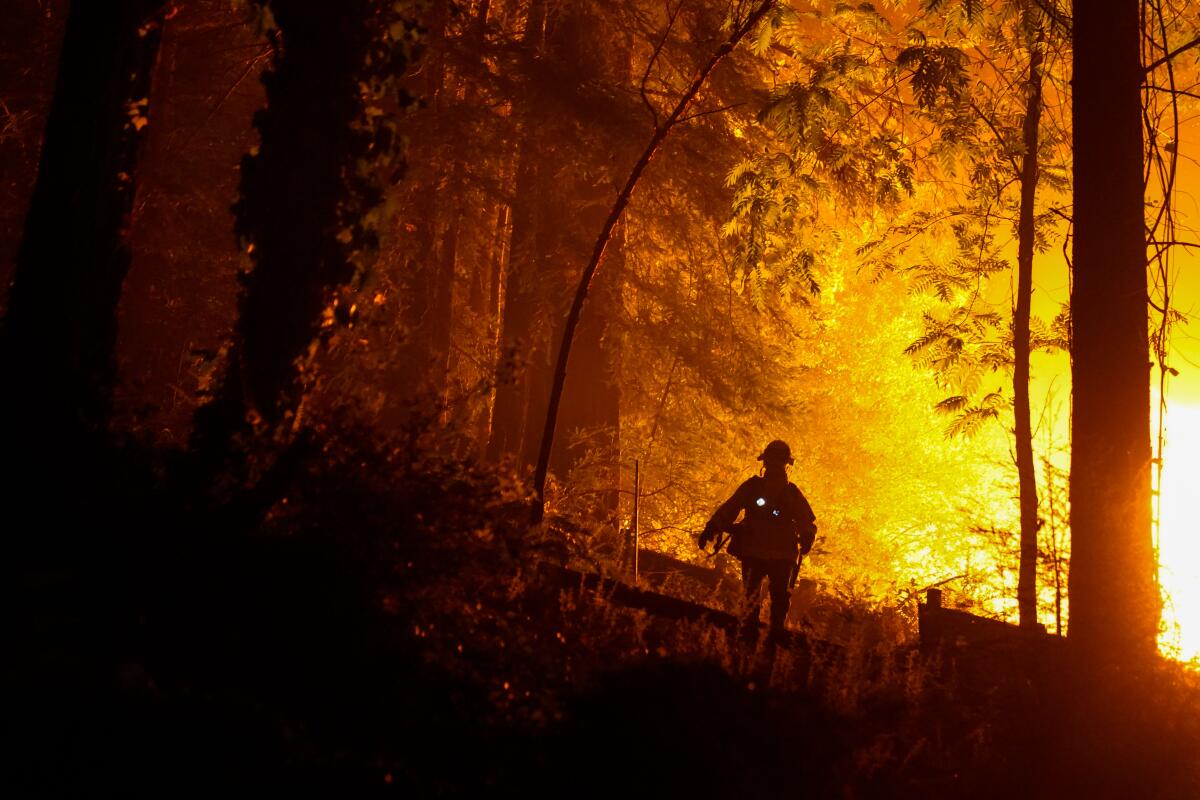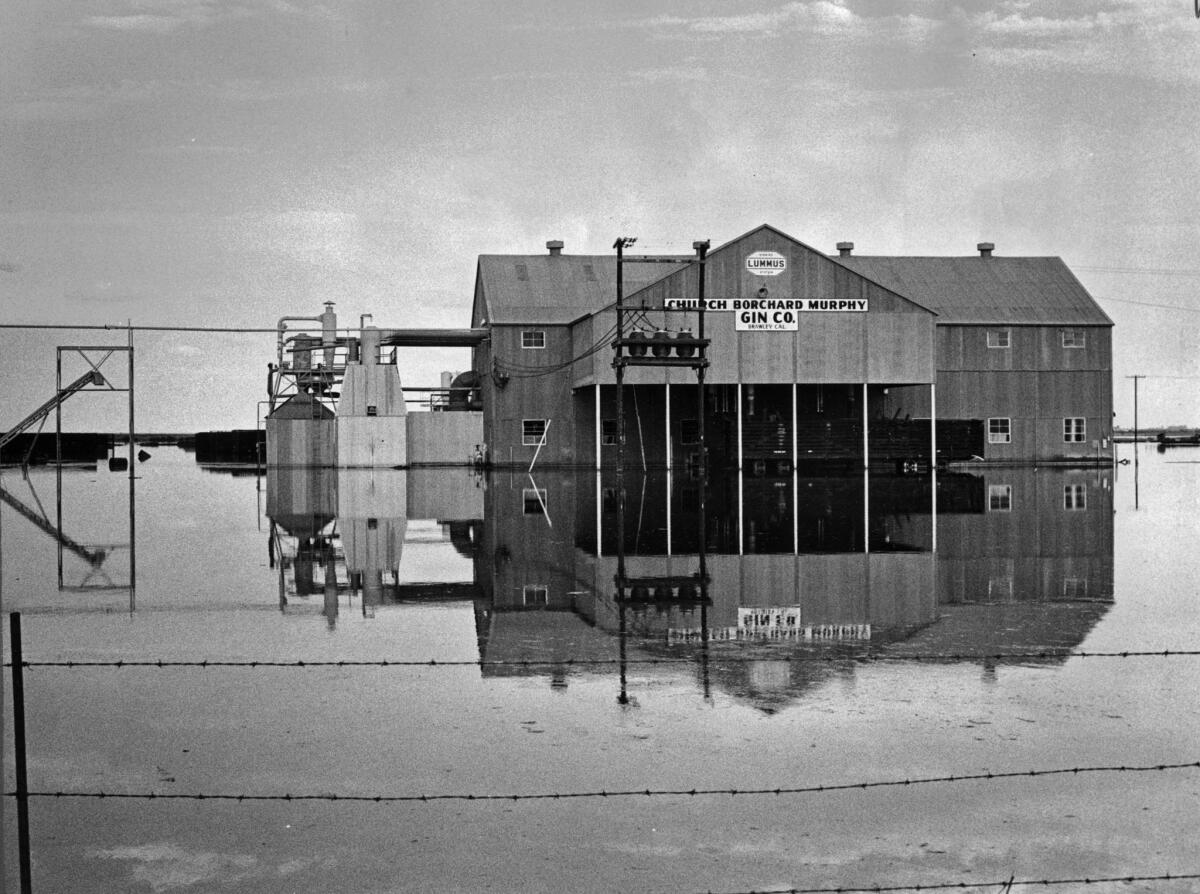Newsletter: Fighting fire with networking

- Share via
These fire-threatened California towns set up their own FEMA-like response.
TOP STORIES
Fighting Fire With Networking
Feeling abandoned by the state and federal government during an unparalleled conflagration of fires, volunteer firefighting units in two Santa Cruz Mountains towns have been forced to tap an alternative: unofficial help from an elite network of the nation’s finest emergency response units — who quickly provided needed equipment and support.
Start your day right
Sign up for Essential California for the L.A. Times biggest news, features and recommendations in your inbox six days a week.
You may occasionally receive promotional content from the Los Angeles Times.
Over the weekend, crews from an elite FEMA Urban Search and Rescue unit in Menlo Park delivered spare water tenders, firefighting rigs, cots, sleeping bags, radios and communications equipment, food and water to struggling units in Boulder Creek and Ben Lomond. There, veteran and decorated first responders established makeshift command and operations centers to battle the CZU Lightning Complex fire raging in the mountains above Silicon Valley.
The unit is called California Task Force 3, and it is one of 28 such forces in the United States. The team of roughly 200 has responded to some of the nation’s most notorious and deadly disasters, including the 2018 Camp fire, the 2010 San Bruno gas line explosion, and notorious hurricanes such as Katrina, Irma and Harvey.
The death toll from the historic firestorms hitting Northern California rose to seven as officials used a small break in the weather to make progress against a series of lightning-sparked blazes that have been burning for a week.
Ominous Warnings
Republicans kicked off their national convention by trying to radically recast President Trump’s failures in containing the coronavirus pandemic as triumphs and by painting an apocalyptic vision of America if Democratic nominee Joe Biden wins in November.
With Trump significantly trailing Biden in national and battleground polls, a parade of elected Republican officials, activists and the president’s eldest son, Donald Trump Jr., sought to lure back suburban and independent voters by trying to erase the president’s perceived deficits of empathy and competence.
But the program was marked by a dissonance between the upbeat, revisionist appeals and the dark, hyperbolic visions that repeatedly warned that Biden would champion socialism and lawlessness while Trump would stand, as one speaker put it, as a “bodyguard” who would protect America. In a rambling midday speech, Trump said that “your American dream will be dead” if Biden wins.
Speakers at the Republican National Convention including Kimberly Guilfoyle, Donald Trump Jr.’s girlfriend and San Francisco’s former first lady, also made California a dystopian punchline.
Meanwhile, the convention’s planned use of the White House as backdrop and speeches from administration officials are breaking norms and bringing admonitions from ethics experts, with some suggesting Trump could potentially violate provisions of federal laws meant to ensure official authority is used for public good.
Feeling in Limbo
Gov. Gavin Newsom appeared to deliver welcome news on Monday to counties that have slowed the spread of coronavirus and been removed from the state’s watchlist only to find themselves in limbo, as they await his long-promised reopening rules.
The governor said counties must wait two weeks to reopen businesses after they come off the state’s list, a timeline that would allow Santa Cruz to open later this week and Placer and San Diego to follow the week after.
“There has to be a 14-day period between the application [and] implementation of not only schools but reopening any sector of the economy,” Newsom said. “So, there’s no delay in that respect for these counties moving forward.”
But later an aide sought to recast Newsom’s comment and it became clear that he misspoke. The fumble only added to the confusion county officials across California are feeling about the directives — or lack thereof — coming from Sacramento since the pandemic began. While Newsom has preached the importance of local control, the state has taken the lead on California’s response and announced public health guidelines with little notice and less explanation for how counties should interpret the rules.
More Top Coronavirus Headlines
— Just one week into fall semester, USC is reporting “an alarming increase” in the number of COVID-19 cases in students among the campus community, according to a Student Health notice.
— A new study found that although Black Americans were more likely than their white counterparts to seek treatment at a hospital, once they got there, their chances of survival were the same. Experts say the results suggest that the racial disparities seen with COVID-19 are not inevitable.
— A man in Hong Kong was reinfected with the coronavirus after recovering from an initial bout in April. Scientists said it was the first case showing that reinfection may occur within a few months.
For more, sign up for Coronavirus Today, a special edition of The Times’ Health and Science newsletter.
FROM THE ARCHIVES
In August 1977, Tropical Storm Doreen hit the coast of Southern California. As it moved inland, the storm unleashed flooding in the Imperial Valley that lingered for more than a week. On Aug. 24, 1977, a Times photographer captured a cotton gin underwater in Brawley. The photo ran in the next day’s paper alongside a story about how farmers in the area had been devastated by the flood waters.
According to the story, a storm a year earlier had done similar damage and the farming communities had hoped they could finally recover their losses. San Diego and Imperial counties ultimately suffered about $25 million in damage from Doreen.

Want more of the Los Angeles Times archives? We’re on Instagram.
CALIFORNIA
— The California Supreme Court overturned the death penalty for Scott Peterson, who was convicted of killing his wife, Laci, in 2002 and their unborn son.
— The state Assembly has approved a ban on the retail sale of flavored tobacco products, with supporters saying it is needed to reduce smoking and vaping by minors and others attracted by flavors that include fruit and menthol.
— Margaret Hunter, the wife of former Rep. Duncan Hunter, was sentenced to eight months’ home confinement and three years’ probation for her role in a criminal conspiracy with her husband to illegally use his campaign money for personal purposes.
— As 480,000 California State University students start a new academic year, the coronavirus crisis has affected their campuses differently: Some are struggling with enrollment, other budget cuts have some universities considering layoffs.
Support our journalism
Subscribe to the Los Angeles Times.
NATION-WORLD
— A long history of militant activism is keeping protests alive in Portland, where demonstrators still face off against police nightly and are met with tear gas, rubber bullets, flash grenades.
— Pebble Mine, one of the most controversial development proposals in Alaska history, failed to pass scrutiny by the U.S. Army Corps of Engineers and qualify for a permit under the Clean Water Act.
— Jerry Falwell Jr.’s future at evangelical Liberty University was unclear as of late Monday, with a senior school official saying he had resigned from his leadership post but Falwell telling several news outlets that he does not plan to leave permanently.
— The German hospital treating Russian dissident Alexei Navalny said that tests indicate he was poisoned.
HOLLYWOOD AND THE ARTS
— TikTok has sued the Trump administration, declaring that the president’s executive order against the popular video app and its Chinese parent company is unconstitutional.
— It’s an issue that comes up every election cycle, and could arise during this week’s Republican National Convention: Can President Trump play any song he wants at a rally, even if the artist despises him?
—Actress Lili Reinhart isn’t shy about depression, bisexuality and body image. But she has more on her mind.
— Justin Townes Earle, the Americana singer-songwriter and son of Nashville songwriter, actor and activist Steve Earle, died on Sunday. He was 38.
BUSINESS
— State officials are poised to decide whether four gas-fired power plants along the Southern California coast should keep running past 2020, despite a policy that sought to close them. It’s the first major energy decision for Gov. Gavin Newsom’s administration after this month’s blackouts.
— As millions of students across the country are beginning a new school year, Zoom said its video conference software was hit with outages and glitches on Monday.
SPORTS
— LeBron James and the Lakers honored the late Kobe Bryant as they defeated the Portland Trail Blazers to take a 3-1 lead in their first-round playoff series.
— The Angels’ Mike Trout is jumping at the chance to prove he has plenty of “burst” after people on social media said he had lost a step.
Free online games
Get our free daily crossword puzzle, sudoku, word search and arcade games in our new game center at latimes.com/games.
OPINION
— Columnist Robin Abcarian asks: How did we end up with a postmaster general who doesn’t know what it costs to mail a postcard?
— As Kamala Harris accepted the Democratic nomination for vice president, it seemed no news outlet, poster or commentator could agree on how to identify her heritage. It put on display the limits of our racial labels, writes columnist Frank Shyong.
WHAT OUR EDITORS ARE READING
— Federal prosecutors have Stephen K. Bannon’s nonprofit organization to promote “economic nationalism” in their sights. (ProPublica)
— From Taco Bell to GEICO, TV commercials were once a cultural force on par with the shows they ran between. Between streaming services and the pandemic pause on production, their days may be numbered. (The Atlantic)
ONLY IN L.A.
The free, Web-browser-based game “Blaseball” has become a hit in these pandemic times. It features teams such as the Baltimore Crabs, the Hades Tigers and Los Angeles Tacos, which have fan-run Twitter accounts and social media feeds that act as fictional news networks. Umpires have the ability to disintegrate players with their eyes, and peanuts — or a peanut — may or may not have deity-like abilities. And the idea for the game began during a playoff game at Dodger Stadium.
Comments or ideas? Email us at headlines@latimes.com.
Sign up for Essential California
The most important California stories and recommendations in your inbox every morning.
You may occasionally receive promotional content from the Los Angeles Times.



